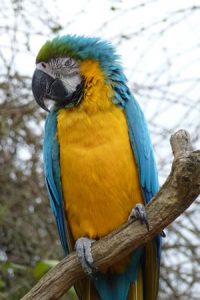The Birds and the Bees for Adults (Parrots, That Is!)
The days are getting longer, and if you have a sexually mature parrot, there may be some major sexual stuff going on - and you might not even know it!
A lot of people believe sexual behavior in adult parrots means they now need to be put in a breeding situation - not true! While there are a FEW birds who truly are not happy as pets and desperately want a mate and babies, they are very much in the minority. For most birds, it's simply a few months of mother Nature's influence, which then passes, revealing your loving companion once again. While some birds do become aggressive at this time, the majority do not. In a true breeding situation, with a bonded pair and a nest box, you will of course, see aggressive, territorial behavior, but generally not so much in single birds in our homes. Some birdies exhibit "selective aggressiveness," depending on the situation and environment.
Basically, sexual behavior starts when the number of hours of daylight begin to lengthen. It's helpful to follow the natural light cycle at this time, getting them up with the sun, and going to bed when it sets. Lots of birds become super cuddly when hormonal, wanting to snuggle more and literally lay in your lap. Touching gets "touchy", since a lot of your usual petting may now be sexually stimulating. Avoid stroking under the wings, under the tail, over the tail (or tugging on it), hands down their full body, or pressure on the back. All of this can be too stimulating, causing frustration. It's like lots of foreplay, with no culmination to follow! While sexual urges are natural, and fairly common in a lot of adult birds, it is not something to encourage.
By the same token, don't discourage or reprimand - simply ignore it, and try to avoid instigating it! Often, we're not aware of our role in the whole process, and unlike "spring fever" in adolescent birds, mature sexuality is often much more subtle, so that we may not even be aware that our birds experiencing it.
In many birds, they're either a bit more affectionate or a bit more grouchy, but not much else is obvious. Some birds exhibit no changes at all. If you do intend to get a mate and embark on the adventure of breeding parrots, please don't start too early! Many people mistake "spring fever" in immature birds as a sign of readiness for breeding, but like all kids, they're simply playacting. Breeding too young puts tremendous stress on Mom - instead of putting energy into her own body's development, it all goes into laying eggs and raising babies. You also tend to get weaker, smaller babies with less vitality.
Another trigger during this phase is anything that looks inviting for nesting - boxes, drawers, cupboards, bags, etc. - cozy protected little nooks and crannies. Avoid having those things around, and definitely don't offer a nest box! Some people do, as a place for birdies to hide, sleep or hang out, but it will make things worse. With some kids, "Happy Huts" will do the same thing - you may want to remove it for awhile.
Be careful! Watch your bird for over stimulation signals - eye pinning, tail fanning, feather puffing, blushing, posturing. You may need to change your approach in handling at this time. Use "step up/down" commands consistently, and avoid having your bird higher than your head and shoulders. You may want to use a hand held perch for bringing your bird out of his cage or off his playstand. Biting can definitely be a problem now. Make use of a "neutral room" when needed, to regain or maintain your position as flock leader.
Other factors affecting sexual behavior include humidity and temperature, as well as lighting and hours of daylight. Normally, nature pushes birds to reproduce right around the time that plants are flourishing, producing lush foliage, seed, flowers, and fruit. This ensures adequate food being available to feed the new hungry mouths!
You may get lucky, and have a parrot who slides right through "breeding season" without batting an eye. Not everyone acts out when the hormones surge! Just be prepared, keep alert, and use good judgment if problems arise. I don't advise doing major behavioral work in the spring if your bird does react negatively, although this is usually when I get a ton of calls begging for help!! Sadly, it also seems to be the time when many birds are put up for sale, as the owners are either unaware or unwilling to deal with this very natural, normal event.
If you do run into problems now, though, it's still advisable to work on behavior after things return to normal. Improving your techniques and building a stronger bond, based on trust and guidance, may help you and your parrot deal better with potential problems next year! Hang in there meanwhile, and don't entice your birdie with provocative behavior. Instead, buy some new toys, feed him more fresh veggies and healthy stuff, and enjoy the promise of new life that accompanies the beautiful season of spring!

